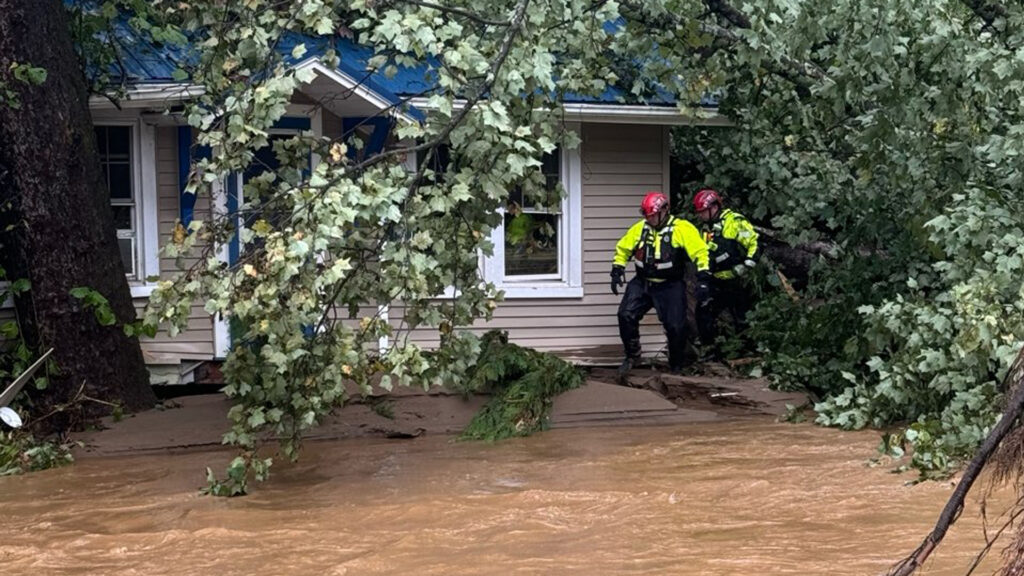By Chris Brown, SmarterSafer Coalition
As the devastating impacts of hurricanes Helene and Milton continue to ripple through parts of Florida, it’s clear we were unprepared for the magnitude of this year’s Atlantic hurricane season.
Even areas once deemed safe from these storms are now experiencing unprecedented flooding and devastation, highlighting the urgent necessity for effective pre-disaster mitigation.
Despite a slow start, this year’s hurricane season, which ends Nov. 30, is on track to exceed the National Oceanic and Atmospheric Administration’s above-normal activity predictions. In years past, Sept. 10 marked the peak of the Atlantic hurricane season. This year, Hurricane Helene formed on Sept. 24, and Hurricane Milton shortly followed on Oct. 5.

The effects of climate change have made weather patterns increasingly challenging to predict, while record-breaking warm ocean temperatures have only fueled more frequent and more powerful storms.
This Atlantic hurricane season has already inflicted over $200 billion in damages and claimed more than 300 lives. Hurricanes Helene and Milton accounted for a significant portion of these losses; each projected to exceed the historic $50 billion mark, a feat only achieved by eight other hurricanes in U.S. history.
Despite being the country’s most hurricane-prone state, fewer than 25% of Florida residents in the most hurricane-affected areas had flood insurance. Less hurricane-prone regions, such as North Carolina and Tennessee, struck by recent hurricane activity, were even less equipped to weather the storm.
In Buncombe County, N.C., where an entire town “disappeared” under floodwaters from Helene, less than 1% of households had flood insurance. Prior to Helene, Asheville was considered a “climate haven,” a place to move to in order to avoid extreme weather conditions. Helene has demonstrated that cities once thought to be safe from severe weather now need to reassess their disaster preparedness efforts.
The lack of flood insurance has been a consistent obstacle to mitigating the impact of extreme weather events. According to the Federal Emergency Management Agency, only 4% of homeowners currently hold flood insurance. For reference, from 2017 to 2019, more than 40% of National Flood Insurance Program (NFIP) claims were for properties outside of official flood hazard zones or in areas the agency had not mapped at all.
The effects of hurricanes Helene and Milton prove that a reactive approach to disaster is unsustainable. Given the year-over-year increase in losses caused by natural disasters, pre-disaster mitigation and resilient infrastructure must be prioritized.
As executive director of the SmarterSafer Coalition, a national advocacy organization promoting fiscally responsible disaster mitigation approaches, has long advocated for FEMA to update its inaccurate and outdated flood maps. This inaccuracy leaves homeowners in the dark about their flood risk and, for many, makes it too late to prepare for or seek assistance when disaster strikes.
The mounting effects of this hurricane season have rendered a reactive approach to disaster mitigation untenable. It’s time for lawmakers to prioritize pre-disaster mitigation, and there is a strong case to be made.
Through smart, safe planning, “climate resiliency and storm protection were built into the fabric of the homes” in Hunters Point, Florida. With concrete walls, hurricane-proof windows and fortified doors, residents who stayed through both storms suffered little to no damage.
The growing number of billion-dollar disasters necessitates a proactive approach to protecting communities and taxpayers’ finances. For example, a recent climate resiliency report by the U.S. Chamber of Commerce found that a significant investment in resilience for a Category 4 hurricane in a major city like Miami would save them an estimated $26 billion.

In addition to investments in infrastructure, strengthening the NFIP through long-term reform is imperative. The program has been undercut by 31 short-term reauthorizations, which creates instability and disincentivizes long-term reform.
As communities brace for the finish of this highly active hurricane season, there are lessons to be learned that can pave the path where resilience is prioritized over vulnerability.
While there is no silver bullet, by prioritizing pre-disaster investments, implementing resiliency measures and ensuring the NFIP’s stability, we can safeguard lives, homes and financial impacts on families and taxpayers.
As communities begin the long and arduous recovery from Helene and Milton, we must pursue an approach that prioritizes resilience and proactivity over vulnerability and reactivity.
Chris Brown is executive director of the SmarterSafer Coalition, a diverse set of organizations that advocate for a fiscally responsible approach to disaster mitigation. This opinion piece was originally published by the Miami Herald, which is a media partner of The Invading Sea. Banner photo: Federal Emergency Management Agency search and rescue operations are conducted in Polk County, North Carolina, after Hurricane Helene. (FEMA photo, via Defense Visual Information Distribution Service).
Sign up for The Invading Sea newsletter by visiting here. To support The Invading Sea, click here to make a donation. If you are interested in submitting an opinion piece to The Invading Sea, email Editor Nathan Crabbe at ncrabbe@fau.edu. To learn more about climate resilience, watch the video below.




I am a retired engineer and have devised a means to prevent loss of vehicles or personal property during high water flooding. The Wall Street Journal indicated that 80,000 vehicles were lost in Florida due to Milton. The rapid deployment of a devise costing under $200 dollars to prevent loss of a +/- $20,000 vehicle should be beneficial to the public, government and insurers. The “Contact Us” feature of SmarterSafer does not appear to be working. Are you aware of any organization that would be interested in supprting final development of this type loss prevention devise?